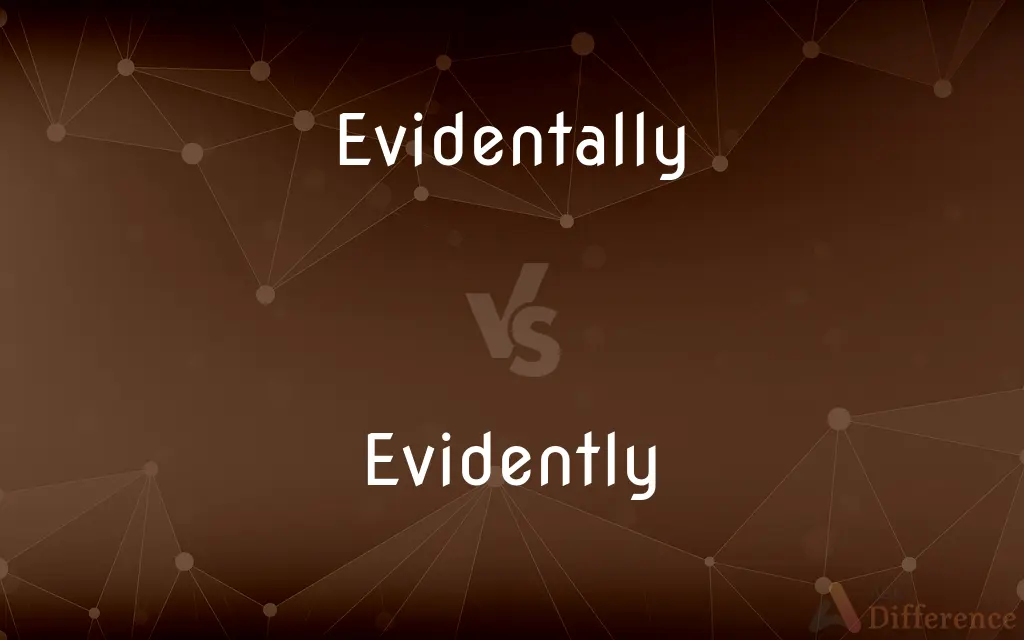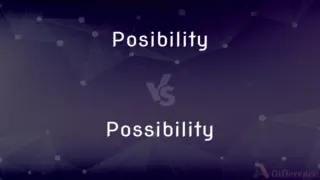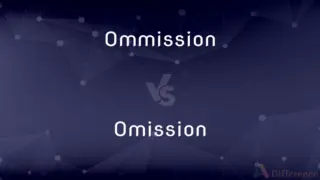Evidentally vs. Evidently — Which is Correct Spelling?
Edited by Tayyaba Rehman — By Fiza Rafique — Updated on March 29, 2024
"Evidentally" is a common misspelling; the correct word is "evidently." Evidently: clearly, obviously, or apparently.

Table of Contents
Which is correct: Evidentally or Evidently
How to spell Evidently?

Evidentally
Incorrect Spelling

Evidently
Correct Spelling
ADVERTISEMENT
Key Differences
Think of the word "evidence" to help with the "evident-" prefix.
Remember "evident" as the base word and add "ly" for the adverb form.
There’s no “a” in "evident", so it shouldn't be in "evidently".
Break the word into syllables for better memorization: ev-i-dent-ly.
Associate "evidently" with synonyms like "apparently" or "clearly" to reinforce the spelling.
ADVERTISEMENT
How Do You Spell Evidently Correctly?
Incorrect: He evidentally misunderstood the instructions.
Correct: He evidently misunderstood the instructions.
Incorrect: Evidentally, she didn't get the message.
Correct: Evidently, she didn't get the message.
Incorrect: The results were evidentally positive.
Correct: The results were evidently positive.
Incorrect: He was evidentally upset about the news.
Correct: He was evidently upset about the news.
Incorrect: The solution was evidentally not going to work.
Correct: The solution was evidently not going to work.
Evidently Definitions
Without any doubt; obviously.
The cake was evidently homemade.
Used to express that something is inferred from evidence and not from direct observation.
Evidently, the meeting went well, judging by their smiles.
In a manner that is clear and easy to understand.
He was evidently upset by the news.
Indicating a situation or fact that is apparent from the evidence at hand.
The project was evidently a success.
Used to describe something that is clearly recognized or understood from the given facts.
Evidently, she had been aware of the surprise all along.
Obviously; clearly.
According to the evidence available
The stranger approached the microphone, evidently intending to speak.
In a manner which makes the fact or conclusion evident; obviously; as may be clearly inferred.
(obsolete) In such a way as to be clearly visible or manifest; distinctly, clearly.
(proscribed) apparently
In an evident manner; clearly; plainly.
Before whose eyes Jesus Christ hath been evidently set forth.
He was evidently in the prime of youth.
Unmistakably (`plain' is often used informally for `plainly');
The answer is obviously wrong
She was in bed and evidently in great pain
He was manifestly too important to leave off the guest list
It is all patently nonsense
She has apparently been living here for some time
I thought he owned the property, but apparently not
You are plainly wrong
He is plain stubborn
Evidently Meaning in a Sentence
He had evidently forgotten about our meeting.
Evidently, they had been planning the surprise party for weeks.
She had evidently made an impression at the interview.
Evidently, the weather is going to be sunny tomorrow.
The door was evidently locked; we couldn't open it.
The project was evidently a success, judging by the client's reaction.
Evidently, the concert was sold out within minutes.
She was evidently the best player on the team.
The path was evidently too steep for the car to climb.
Evidently, the book was more popular than the author had anticipated.
Evidently, the policy had been in effect for several years.
The solution was evidently simpler than we had thought.
He had evidently taken the wrong train.
The test results were evidently positive, to everyone's relief.
He was evidently not aware of the changes to the schedule.
Evidently, the rumor about the merger was true.
He listened to the explanation and nodded, evidently satisfied.
The movie was evidently going to be a box office hit.
Evidently, the event had been cancelled at the last minute.
She answered the question correctly, evidently understanding the material.
Evidently, the negotiations were more complicated than expected.
The cat was evidently pleased with its new toy.
She was evidently upset, even though she tried to hide it.
Evidently, there was a misunderstanding between them.
The garden was evidently well cared for.
Evidently Idioms & Phrases
Evidently so
A phrase used to agree with something that appears to be true.
He's the expert in this field. Evidently so, given his detailed presentation.
Evidently clear
Obviously clear or apparent.
The importance of the issue was evidently clear to all attendees.
Evidently not
Used to indicate that something is clearly not the case.
Did the explanation make sense to you? Evidently not, since I'm still confused.
Evidently aware
Being clearly conscious or knowledgeable about something.
He was evidently aware of the implications of his decision.
Evidently enough
Used to suggest that something should be clear or obvious enough.
Evidently enough, the project needs more time before it can be completed.
As evidently shown
Used to point out something that has been clearly demonstrated.
As evidently shown in the experiment, the new compound is more effective.
Make it evidently clear
To make something extremely clear or obvious.
She made it evidently clear that she was not interested in another date.
Evidently mistaken
Clearly wrong or incorrect.
I was evidently mistaken about the time the movie started.
Evidently lacking
Obviously missing or deficient.
The proposal was evidently lacking in detail, which raised several questions.
Evidently the case
Clearly being the situation.
It's evidently the case that we need to adjust our strategy.
Common Curiosities
What is the root word of evidently?
The root word is "evident."
Why is it called evidently?
The term "evidently" derives from "evident," meaning clear to the sight or mind.
What is the verb form of evidently?
"Evidently" is derived from the adjective "evident"; there's no direct verb form.
Which preposition is used with evidently?
Various prepositions can be used with "evidently" based on context, but it's commonly used without one.
Which vowel is used before evidently?
No vowel is typically used before "evidently."
Which article is used with evidently?
As an adverb, "evidently" typically doesn't require an article.
Is evidently a noun or adjective?
Neither, "evidently" is an adverb.
What is the pronunciation of evidently?
The pronunciation of "evidently" is /ˈɛvɪdəntli/.
What is the singular form of evidently?
Evidently is an adverb and doesn't have singular or plural forms.
Which conjunction is used with evidently?
Any conjunction can be used before or after "evidently", such as "and" or "but."
What is the opposite of evidently?
A possible opposite could be "unclearly" or "ambiguously."
What is the plural form of evidently?
Evidently is an adverb and doesn't have singular or plural forms.
Is the word evidently imperative?
No, "evidently" is not imperative.
How many syllables are in evidently?
There are four syllables in "evidently."
Which determiner is used with evidently?
Evidently, being an adverb, doesn't typically require a determiner.
Is evidently a countable noun?
Evidently is not a noun, it's an adverb.
What part of speech is evidently?
"Evidently" is an adverb.
What is another term for evidently?
Another term for "evidently" is "apparently."
Is evidently a collective noun?
No, "evidently" is not a collective noun.
Is the evidently term a metaphor?
No, "evidently" is not used as a metaphor.
How do we divide evidently into syllables?
"Evidently" can be divided as: ev-i-dent-ly.
What is a stressed syllable in evidently?
The stressed syllable is "ev" in "evidently."
Is evidently an adverb?
Yes, "evidently" is an adverb.
Is evidently an abstract noun?
No, "evidently" is not an abstract noun; it's an adverb.
Is evidently a negative or positive word?
It is neutral but can take on a positive or negative connotation based on context.
Is evidently a vowel or consonant?
"Evidently" is a word containing both vowels and consonants.
What is the first form of evidently?
"Evidently" is an adverb and doesn't have verb forms.
What is the second form of evidently?
Evidently doesn't have a second form as it is an adverb.
What is the third form of evidently?
Evidently doesn't have a third form as it is an adverb.
How is evidently used in a sentence?
Evidently, he had forgotten about the meeting.
Share Your Discovery

Previous Comparison
Posibility vs. Possibility
Next Comparison
Ommission vs. OmissionAuthor Spotlight
Written by
Fiza RafiqueFiza Rafique is a skilled content writer at AskDifference.com, where she meticulously refines and enhances written pieces. Drawing from her vast editorial expertise, Fiza ensures clarity, accuracy, and precision in every article. Passionate about language, she continually seeks to elevate the quality of content for readers worldwide.
Edited by
Tayyaba RehmanTayyaba Rehman is a distinguished writer, currently serving as a primary contributor to askdifference.com. As a researcher in semantics and etymology, Tayyaba's passion for the complexity of languages and their distinctions has found a perfect home on the platform. Tayyaba delves into the intricacies of language, distinguishing between commonly confused words and phrases, thereby providing clarity for readers worldwide.














































